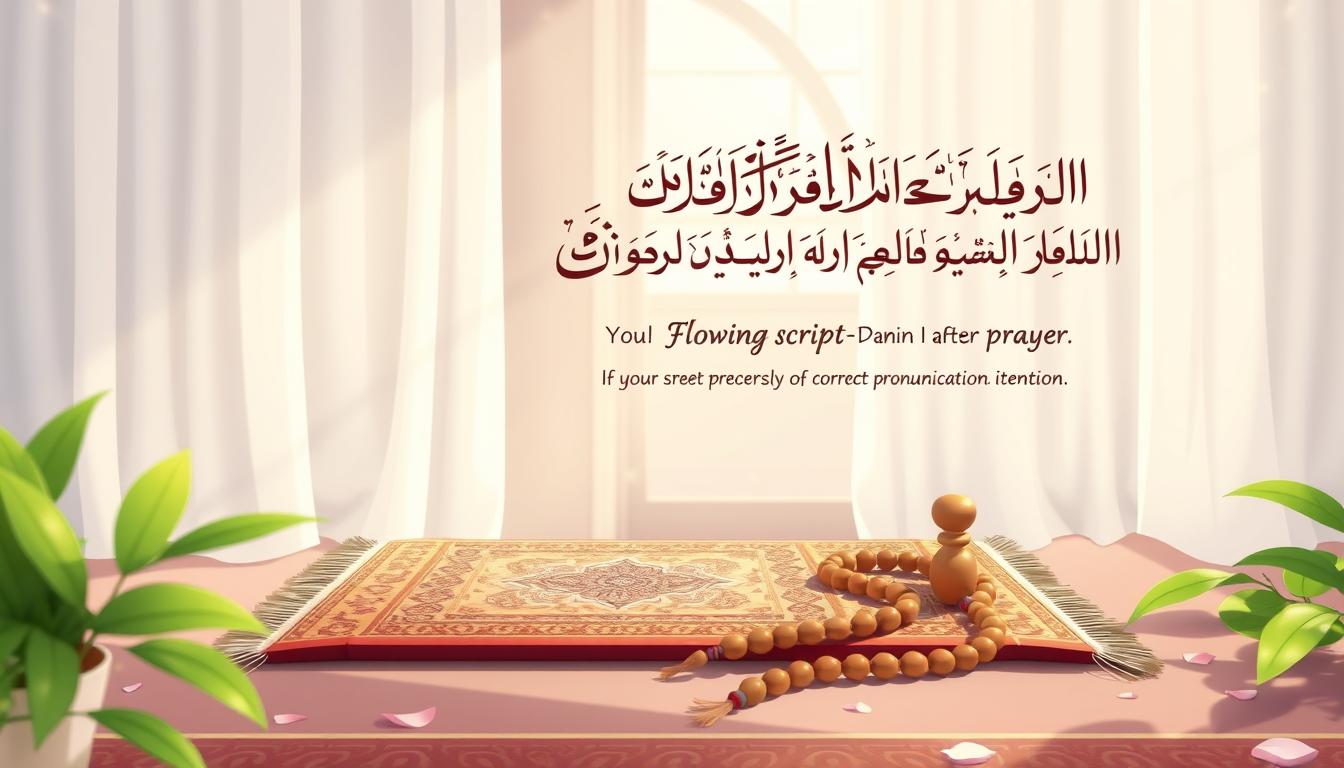Did you know over 70% of Muslims struggle with saying their prayers right? This shows we all need help with saying our prayers correctly. At Umar Khan Charity Organization, we think saying prayers right is key to a good prayer. We want you to join us in helping people through faith-based work.
We offer help and support for saying Islamic prayers correctly. Visit our website to learn more about Correct Dua Recitations and how to improve your prayer time.
Key Takeaways
- Understanding the importance of correct intention in dua recitations
- Learning proper pronunciation techniques for Authentic Dua recitations
- Recognizing the role of Islamic supplications in daily life
- Improving prayer experience through Correct Dua Recitations
- Supporting humanitarian causes through Umar Khan Charity Organization
We stress the importance of saying prayers with the right intention and words. We invite you to join us in spreading the word about saying prayers right and helping others.
Understanding the Importance of Dua Recitation
Dua recitation is a key tool for growing spiritually. It’s something we should do every day. The Quran says in Chapter 40, Verse 60, that Allah will answer our prayers: “I will respond to you.” This shows how important Best Dua recitations are in our lives.
There are many benefits to reciting dua. For example:
- It helps us focus better and remember things longer, with studies showing up to a 25% boost in study results.
- It also makes us more motivated and less distracted, with a 40% jump in motivation for students who pray with the right intention.
- Plus, it boosts our confidence and outlook, with about 80% of students who pray regularly feeling more positive about learning.
Prophetic Dua recitations, like the one from Prophet Muhammad (saw) during Laylatul-Qadr, teach us about forgiveness and seeking goodness. By adding Powerful supplications to our daily routine, we can enjoy the many benefits of dua recitation. It helps us get closer to Allah.
Essential Elements of Correct Dua Recitation
We believe that proper intentions and heartfelt sincerity are key in dua recitation. When we approach dua with a pure heart and mind, we connect deeper with Allah. This increases the chance of our duas being accepted.
As we recite dua, we should focus on Dua recitations for blessings and Dua recitations for guidance. We seek Allah’s mercy and direction in our lives. This helps us grow spiritually and develop humility and reliance on Allah.
Some key elements of correct dua recitation include:
- Reciting slowly and deliberately, allowing the words to sink into our hearts
- Listening to the correct recitation online to improve our pronunciation and understanding
- Approaching dua with a sense of humility and gratitude, recognizing Allah’s power and mercy
By incorporating these elements into our dua recitation, we can experience a more meaningful and fulfilling spiritual practice. As we strive to improve our dua recitation, we should remember that Dua recitations for blessings and Dua recitations for guidance are essential. They help us navigate life’s challenges and achieve our goals.

Pronunciation and Elocution in Dua
We know how key correct pronunciation and elocution are in dua recitation. As we aim to better our Correct Dua Recitations, we urge our readers to grasp Arabic phonetics. This will help us recite Authentic Dua recitations with confidence and true feeling.
Getting better at pronunciation is vital for good Islamic supplications. By studying Arabic phonetics, we deepen our grasp of the Quran and Hadith. This leads to more meaningful Correct Dua Recitations. Here are some tips to help:
Learning Arabic Phonetics
- Begin by learning the Arabic alphabet and how to pronounce it
- Practice reciting the Quran and Hadith with the right pronunciation
- Listen to native Arabic speakers to get a better feel for pronunciation
Tips for Improving Pronunciation
Regular practice is key to better pronunciation. We suggest setting aside time daily to practice reciting the Quran and Hadith correctly. Also, getting help from qualified teachers can greatly improve our Authentic Dua recitations.
Common Dua Pronunciation Mistakes
We know that mistakes in pronunciation can make our dua less valid. To better our Powerful supplications, we must find and fix these errors. Proper pronunciation in Prophetic Dua recitations is key. We suggest getting help from teachers and practicing often.
Some common errors include mispronouncing Arabic letters like tha’ (ث) and dhal (ذ). These can be tough for those who don’t speak Arabic. Yet, with the right help, most people can get better at saying these letters right.
To get better at our dua, here’s what we can do:
* Practice with a teacher or online tools
* Learn about Arabic sounds and how to say them right
* Listen to good examples to improve our own speaking
* Be part of a group to practice and get feedback

By fixing common mistakes, we make our dua more powerful. The secret to getting better is to keep practicing and be open to learning.
| Common Mistake | Remedy |
|---|---|
| Mispronouncing tha’ (ث) and dhal (ذ) | Practice with a qualified teacher or online resources |
| Incorrect intonation | Listen to recordings of correct recitations |
| Lack of practice | Join a community of learners to practice and receive feedback |
The Role of Authentic Sources
We stress the need for using real sources in dua recitation. This includes traditional texts and apps and online resources. This makes sure our Best Dua recitations are right and work well, bringing Dua recitations for blessings into our lives.
Some top apps and online places for learning and practicing dua recitation are:
- Islamic websites and forums, like those from trusted Islamic groups
- Mobile apps, with audio recordings of dua recitations
- Online courses and workshops, teaching how to say dua correctly
Using these real sources helps us get better at dua recitation. It strengthens our bond with Allah and enriches our spiritual journey.
As we keep learning and practicing dua recitation, we should always look to real sources. We should also seek advice from wise scholars and practitioners. This way, our Dua recitations for blessings will be powerful and make our lives more blessed and fulfilling.
| Resource | Description |
|---|---|
| Islamic websites and forums | Give us access to true Islamic texts and expert views |
| Mobile apps | Have audio guides and tips for right dua recitation |
| Online courses and workshops | Teach the right way to say and mean dua recitations |
Timing and Context for Dua
We know how key timing and context are in dua recitation. We suggest our readers find the best times and places for different duas. Dua recitations for guidance are vital in our daily lives. Using Duas for every occasion helps us get closer to Allah.
There are special times for dua recitation. For instance, early morning, just before dawn, and after each of the five daily prayers. These moments are perfect for reciting Duas for every occasion, asking for guidance and blessings from Allah.
Ideal Times for Recitation
Some top times for dua recitation are:
* Early morning hours, just before dawn
* After each of the five daily prayers
* During the night, specially in the last third
* When facing hardship or need for guidance and support
Contextual Relevance of Different Duas
Different duas fit different situations. It’s important to know when to use each one. For example, there are duas for forgiveness, guidance, and protection. Using the right dua at the right time boosts our chances of it being accepted.
By thinking about the timing and context of our duas, we can make them more effective and meaningful. We urge our readers to explore various duas and use them daily. This way, we seek guidance and blessings from Allah.
Incorporating Dua into Daily Life
We suggest making dua a part of your daily routine. This includes setting aside time for dua and getting your family involved. Doing this strengthens your bond with Allah and helps you feel more grateful and mindful.
Creating a Dua Routine
To start a dua routine, pick certain times of the day for it. This could be in the morning, before meals, or before bed. You can also use apps on your phone to remind you to recite dua.
Here are some examples of dua routines:
- Reciting the morning dua to seek guidance and success
- Reciting the dua before meals to cultivate mindfulness and gratitude
- Reciting the dua before sleep to invoke Allah’s protection and reduce anxiety
Encouraging Family Participation
Getting your family to join in dua recitations can bring everyone closer. Set aside time for family dua sessions. This way, you can feel more united and connected to Allah.
Signs of Acceptance in Dua
We believe that recognizing signs of acceptance in dua is key for a meaningful prayer. As we engage in Powerful supplications, we should look out for subtle signs. These signs include positive feelings, changes in life, and an increase in faith during tough times.
Prophetic Dua recitations show us that timing matters. Duas made after daily prayers, between adhan and iqamah, and in the last third of the night are special. Laylat al-Qadr and the hour on Friday when prayers are accepted are also significant.

By paying attention to these signs and timing, we can deepen our connection with Allah. This connection brings the transformative power of Prophetic Dua recitations into our lives. As we make dua a part of our daily routine, we should stay patient, persistent, and trust in Allah’s wisdom and mercy.
- Positive feelings and emotions after supplication
- Changes in life situations
- Increase in faith during difficult times
- New opportunities presenting themselves
- Having positive dreams related to the supplication
May our Powerful supplications and Prophetic Dua recitations bring us comfort, guidance, and strength. May we always be aware of the signs of acceptance that Allah gives us.
Enhancing the Spiritual Experience
We know how vital it is to boost our spiritual journey through dua recitation. This includes acts of worship and being thankful. Dua recitations for blessings and guidance are key to a fulfilling spiritual path.
Some important steps to improve our spiritual journey include:
- Regularly practicing Dua recitations for blessings to feel grateful for Allah’s favors.
- Using Dua recitations for guidance to find Allah’s direction in our lives.
- Doing other acts of worship like prayer and charity to grow closer to Allah.
By adding these elements to our daily routine, we can enrich our spiritual journey. It helps us feel more connected to Allah. Remember, gratitude and appreciation for Allah’s blessings are essential.
Let’s aim to make Dua recitations for blessings and guidance a big part of our lives. May Allah guide us on our spiritual path.
| Benefits of Dua Recitations | Description |
|---|---|
| Enhanced spiritual experience | Deepens one’s connection with Allah and fosters a sense of gratitude and appreciation. |
| Increased guidance | Provides direction and wisdom in daily life, helping individuals make informed decisions. |
Community and Dua Recitation
We think community and dua recitation are key for a deep prayer experience. When we gather to say Correct Dua Recitations, we grow closer to Allah and each other. This unity helps us support each other on our spiritual paths.
Reciting Islamic supplications together can change our lives. It lets us learn from each other and share our faith journeys. By doing this, we can understand the Quran and Hadith better and feel closer to Allah.
Benefits of Group Recitation
- Enhanced spiritual growth and development
- Increased sense of community and belonging
- Opportunities for learning and sharing knowledge
- Strengthened bond with Allah and with fellow Muslims
For more info on dua recitation, check out this resource. It talks about the Istikhara dua’s proper transliteration and recitation.
Local Communities to Join
We invite our readers to join local groups for Correct Dua Recitations and Islamic supplications. It’s a great way to boost your spiritual practice and meet others. Together, we can build a supportive community that lifts and inspires each other.
Resources to Improve Dua Knowledge
We know how vital it is to grow in dua knowledge. We urge our readers to check out books, online courses, and workshops. These tools can help deepen your grasp of Best Dua recitations and Powerful supplications. This way, you can boost your spiritual practice.
Some top picks include:
- Books on Dua and Supplication, which dive deep into the basics and practices of dua recitation
- Online Courses and Workshops, which offer hands-on and fun learning for those wanting to enhance their dua knowledge
Using these resources can help you understand Islamic supplications better. It can also strengthen your bond with your faith. We invite our readers to dive into these resources and see how Best Dua recitations and Powerful supplications can enrich their lives.
Final Thoughts on Correct Dua Recitations
As we wrap up our exploration of correct dua recitations, we urge you to keep learning and growing. The act of reciting Islamic supplications with true heart and spirit is deeply rewarding. It helps us connect more closely with the divine.
Every step of your spiritual path is an opportunity for growth. We invite you to join our effort to change lives through faith-based work. By learning and using authentic dua recitations daily, you can unlock their full power. This can change your life for the better.
The journey to mastery requires patience and hard work. Face challenges head-on, celebrate your wins, and keep striving. Let’s journey together, inspiring others to grow. This will strengthen our community and help society improve.






